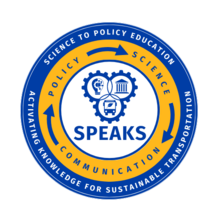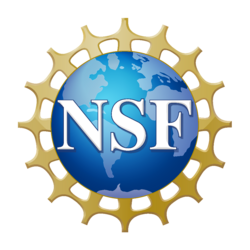Training Opportunities - SPEAKS Trainees will benefit from the many educational, personal and professional growth, and training opportunities offered by the SPEAKS program. All SPEAKS students receive the following:
-
SPEAKS training in essential skills such as ethics, communication, teamwork
-
Access to UCR’s unique Science to Policy Program: https://sciencetopolicy.ucr.edu/
-
Mentoring and leadership opportunities
-
Coursework in engineering, computer science, physical sciences, social sciences, communication and public policy
-
Opportunities for internships in governmental agencies, NGOs and industry
-
Access to travel funding support related to SPEAKS research.
-
SPEAKS Certificate upon completion of all SPEAKS requirements
Funding Opportunities - SPEAKS offers a limited number of one-year fellowships and opportunities for travel funding support.
* SPEAKS fellowships and travel funding are subject to the continuation of this award by the National Science Foundation.
SPEAKS Scholars are domestic and international UCR students who are funded through sources outside of SPEAKS as outlined in their UCR admissions offer.
SPEAKS Fellows are domestic UCR students (per NSF regulations) who have been awarded the funded SPEAKS fellowship. SPEAKS Fellows receive up to one year of support as a $34,000 stipend paid through a GSR Fellow appointment + cost of education support.
Travel funding opportunities are available to SPEAKS students in limited amounts. Please visit the Resources page for further details.
UCR’s SPEAKS Program (Science to Policy Education: Activating Knowledge for Sustainable Transportation) offers a unique opportunity for Ph.D. students to focus their studies on the important issue of how to make transportation more sustainable. The SPEAKS program is open to all Ph.D. level graduate students at UCR and offers a number of benefits, including one-year graduate fellowships, a certificate in Science-to-Policy, workshops, tutorials, travel funding, among other things. A successful SPEAKS program participant will be required to carry out a number of activities during their Ph.D. careers, as specified below.
Kick-Off Orientation—each year, a one-day event will be held in September prior to the beginning of Fall quarter classes. This SPEAKS orientation event will be required for all incoming SPEAKS trainees; in addition, continuing SPEAKS trainees will be required to attend a half-day of this orientation event. This event will include:
- An overview of the SPEAKS Graduate Student Traineeship Program;
- A chance to meet SPEAKS faculty, staff, students and partners;
- Introductory training on Communication, Resources, Collaboration and Team-building
Core Coursework—students in the SPEAKS Program will be required to take several courses (or equivalent) during their Ph.D. careers, meeting their departmental requirements while also satisfying the breadth requirements of the SPEAKS program. Equivalent coursework or experience accepted by approval of SPEAKS Curriculum Committee only.
|
Required SPEAKS Courses |
|
|
SPEAKS Electives |
Select any three elective courses from the list below. A minimum of one course must be outside the trainees’ major department: |
|
Engineering and |
|
|
Physical Sciences |
|
|
Social Science Methods |
|
|
Public Policy |
|
|
Other |
|
Science-to-Policy Certificate Course—SPEAKS trainees will be required to take this unique ten-week certificate course which teaches trainees about science policy, advocacy, and communication with the objective to cultivate a knowledge base and tangible skill set that trainees can use to translate research into public policy or transition into policy careers (see https://sciencetopolicy.ucr.edu/ for more information). This course is offered annually.
Professional Development Events— SPEAKS Trainees are required to participate in a minimum of four professional development events over the course of their Ph.D. career, including Responsible Conduct of Research training. Eligible events may include workshops organized by SPEAKS staff and faculty, SPEAKS Trainees, UCR Science-to-Policy Student Cabinet, National Science Policy Network, or other campus departments. SPEAKS will host up to four events per year designed to strengthen practical skills and foster engagement with policymakers, regulatory agencies, community organizations, and industry professionals. Attendance at SPEAKS-hosted events is mandatory.
Surveys and Reports—trainees are required to complete all scheduled SPEAKS evaluation survey activities and annual NSF reporting requirements.
A number of other optional elements are available to SPEAKS Program participants:
GradEdge/Jumpstart—an eight-week summer program is offered by Graduate Division for incoming under-represented UCR Ph.D. STEM students. This program provides an opportunity for eligible Trainees to jump start their professional and academic development through seminars, community building, research activities and support. This program is offered as part of the student funding package rather than on an application basis. Not all trainees will be eligible. Due to the length and content of this program, it can serve as a SPEAKS required elective for Trainees who participate.
Science 2 Policy (S2P) Student Cabinet—the S2P Student Cabinet works to develop S2P curriculum, foster relationships with policymakers, and hosts events to connect students to the policy world.
Science 2 Policy Internship/Policy Fellow—trainees will have the opportunity to intern for a minimum of one quarter in local policy makers' offices, government agencies, NGOs, non-profits, or other organizations on timely issues which would benefit from scientific expertise. A modest fellowship stipend may be available. This element is optional, but strongly encouraged. Placements are typically available following the successful completion of the S2P Certificate Course.
Science to Policy Events – trainees will have the opportunity to participate in events such as the staging of a mock policy hearing, policy hackathons, policy slam pitch competitions, visits to policy offices and connect with the National Science Policy Network.
Designated Emphasis in Sustainable Transportation—it will be possible in the future for a SPEAKS program participant to receive a “Designated Emphasis” in Sustainable Transportation, highlighted on their transcript and Ph.D. Diploma. Note that this element is currently in development.

